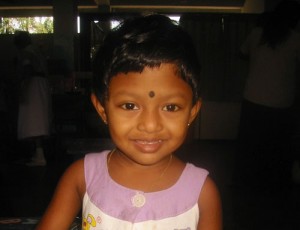Improving Care

In many parts of Asia, care for blood disease in children is less than optimal. Essential drugs, including antibiotics, are available to only a proportion of children. Inadequate laboratory support often results in delayed diagnosis and treatment of these serious diseases. This generally meager network of care, and inadequate support for families, often results in erratic follow-up. Further, while in higher-income countries, cure is now possible for many children affected by these diseases, but in both Sri Lanka and Kolkata, these approaches to cure are available only to the richer citizens. As a result of all of this, a child with a blood disease may lose his or her chance for survival and, over the last months of life, suffer a markedly compromised existence.
Ensuring that the treatment for iron overload provided is safe and effective
Children with blood diseases require frequent (often, as often as monthly) blood transfusions. Blood transfusions are life saving but, unfortunately, humans have no ability to eliminate excess iron from the body, and inevitably iron accumulates from transfusions. Iron overload gradually damages a patient’s organs, predominantly the liver and heart, frequently resulting in early death from organ failure. Effective and powerful drugs called “iron chelating agents” are essential to treat iron overload, but chronic treatment with these drugs must be monitored carefully, or toxicity may occur. Iron chelating agents are free to the patient in Sri Lanka, as well as in other countries with universal healthcare; however, these drugs are not yet free to every patient in India. Over the last decade, a simple, reliable method for monitoring iron overload called Ferriscan® was established to measure the amount of iron in a child’s liver known as the liver iron concentration. Ferriscan® is a non-invasive technique which relies upon magnetic resonance imaging (MRI). Liver iron concentration is expressed in milligrams per gram of liver (mg/g) and treatment aims for a level generally below 7 mg/g, which can be achieved by titrating the doses of iron chelating agents the child is receiving aginst the number obtained by Ferriscan®. In higher-income countries, Ferriscan® are usually obtained in each child every year.
In 2009, with the assistance of our colleague Professor Tim St. Pierre (Perth, Australia), the inventor of Ferriscan®, we introduced Ferriscan® monitoring for a group of thalassemia patients in Sri Lanka. Hemoglobal® now has as a goal to assist every child at risk of iron overload in obtaining a Ferriscan measurement every three years, in both Sri Lanka and in Dr. Prantar Chakrabarti’s center in Kolkata. This will allow each child’s physician to safely increase the effectiveness of drug treatment. The expenses associated with a child’s travel for this test, as well as with the technical aspects of obtaining and interpreting this measurement are about $300 in Sri Lanka. Implementing this modality in Kolkata for all children receiving transfusions is one of our 2020 goals.
Your gift of $300 pays for all expenses for one Ferriscan per child in Sri Lanka to allow the child’s physician to safely increase the effectiveness of drug treatment in the child.
Clinic manager
Most clinics in North America manage relatively small patient numbers (most thalassemia programs in the USA, for example, are responsible for fewer than 50 patients). At the National Thalassemia Center in Kurunegala, Sri Lanka, approximately 1,000 thalassemia patients are seen regularly, while at the Medical College of Kolkata, up to 2,000 thalassemia patients require regular review. These examples highlight only two clinics, managing only patients with the disorder of thalassaemia; these estimates do not include the numbers for children affected with hemophilia or leukemia. Within Asia, there are hundreds of centers responsible for managing more patients per day than many clinics in higher-income countries review per month.
Even where resources are not as limited as in these centers, organization within such large numbers of patients can be daunting. Support staff make a critical difference day to day in the care and life of a child. For example, our clinic manager, Karuna (Show Picture) at the National Thalassemia Center in Kurunegala, Sri Lanka, functions as the person on whom patients and health care workers can depend every day for organizing consultations, coordinating appointments, recording data. Karuna’s dedicated work has proved essential to provision of better patient care. Hemoglobal® currently supplements Karuna’s Ministry of Health stipend. Support is desperately needed in other centers in Sri Lanka and in Kolkata — and ultimately throughout Asia where large clinics struggle under the burden of large numbers and few staff.
Your donation of $4,000 per year can supplement the salary of a Clinic Manager for one year.
Clinic Counsellor
Emotional support for these children – who, with their families, are often already struggling for existence in a poor setting — is even more necessary when the child and family are suddenly affected by a potentially fatal blood disease. In both countries, the heavy demands of large numbers of patients, in parallel with the small numbers of expert nurses and physicians available, can be eased by the presence of a clinic counselor – an individual who is involved in and critical to the health of the family and its ability to cope with the tragedy of serious illness in a child.Advice, social support, discussion and education, and having someone who is trusted and helpful every time a family visits may help to ease the burden of disease.
Your donation of $1,200 per year supplements the salary of a Clinic Counsellor for one year.
Managing patient data
Dedicated data managers are important to operation of every clinic because it is through the efforts of such individuals that important data critical to chidlren’s treatment history – and hence his or her survival – are not lost in a wave of paper. This is particularly true because of the great distance between institutions in both Sri Lanka and Kolkata, and because communication between experts is essential for optimal care.
Your donation of $3,000/year provides computer support and the expertise to enter data and manage it.